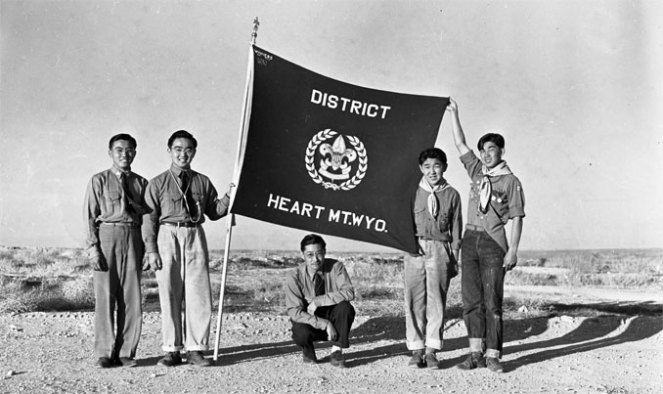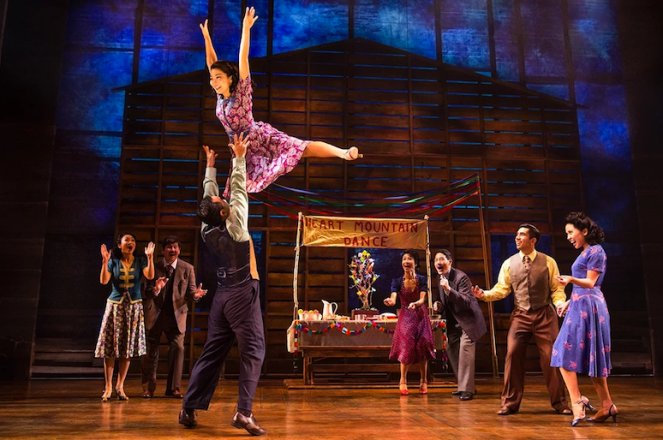Last week, the Hop screened a live performance of the new musical, Allegiance, featuring George Takei. In addition to attending this performance and writing the review below, Paddock Student Worker, Betty Kim, created a list of resources for further research on the topic of Japanese Internment for Paddock.
George Takei, a retired WWII soldier, receives a document from a woman who tells him his sister has recently died. Suddenly, the ghosts of his past rise up around him, and the audience is thrown into a tumult of his memories; from a young man who begins to challenge his father’s authority, to a positive spirit in the Heart Mountain concentration camp, to a purple-heart wearing war hero in fascist Italy, he becomes a regretful veteran cut off from the rest of his family, only finding some closure at the very end of the musical.


February 19 (the date of the showings at the Loew Auditorium) was the anniversary of Franklin D. Roosevelt signing Executive Order 9066, which facilitated the internment of Japanese-Americans and other “enemy” ethnic groups during WWII. A member of the Asian Pacific Islander Caucus who introduced the performance of Allegiance to the audience said that the themes of this musical are especially relevant to the current political situation. The story can be related to the same anti-immigrant sentiment that gave rise to the travel ban, the idea of a Muslim registry, and other Islamophobic policies proposed under the Trump administration.
Though in the U.S. there is arguably much more critical commentary of Nazi war crimes/concentration camps during WWII, Allegiance focuses on the mistakes of Americans, the titular implication of what it means to be loyal to one’s country, and the multifaceted stories of Japanese-Americans during the war.
One of my favorite elements of the play was just that: the diversity of the characters. No, not just the fact that it’s the first play by Asian-Americans, about Asian-Americans, with a predominantly Asian-American cast; rather, the rare and refreshing portrayal of Asian (Japanese)-Americans as diverse within their race. Though the families that meet at Heart Mountain Concentration War Relocation Center are united in their effort to make a life in desolate, dry Wyoming, they also hold vastly different views on what it means to be loyal to one’s people and one’s country, which dramatically decides their fates.

For example, there’s the contention between Sammy Kimura and Frankie Suzuki, played by Telly Leung (Glee) and Michael K. Lee (Jesus Christ Superstar, Miss Saigon). Both are determined to save their families and win justice for their fellow Japanese-Americans. But while Sammie enlists in the army to prove his loyalty to America, receiving a purple heart for his heroism, Frankie leads movements of resistance in the concentration camps and is eventually jailed. Despite their shared sense of allegiance, their differences are never reconciled, even when Sammie’s sister Kei becomes pregnant with Frankie’s child and marries him.
Though the play dealt with heavy themes, it maintained an ability to entertain and fascinate: songs like “Wishes on the Wind” and “Ishi Kara Ishi” let audience members see and hear elements of Japanese culture, reappearing throughout the play in different contexts. Sometimes the songs were entertaining, but sardonically so, like Frankie’s sarcastic “Paradise,” in which he upstages Sammy’s dance party by singing about his resentment of the camp and the situation in general.


And who could forget George Takei’s second role as Ojii-San, a lovable and hilarious grandfather who makes a garden grow in the arid, dust-ridden lands of rural Wyoming? From his offhand comments and card tricks that don’t work, to his unconditional support of his children and grandchildren, it’s hard to believe Takei also plays the serious and seriously conflicted veteran in the beginning and end of the play.
Allegiance was a musical that humanized both sides, and told the stories of the many factions within the conflict. Not only did it deal with racial identity and its complicated ties with national identity, it also instructed as much as it entertained. As we laugh and cry at productions like these, we should also remember to refuse to isolate racism and xenophobia as a thing of the past; in fact, Allegiance’s star Takei is iconic for both his acting and his activism, and this musical is based partly on his own experiences as a child in a concentration camp. This is all the more reason to remember to understand what it means to resist against forces of evil, and why it is so important to do so.
Edited by Memory Apata